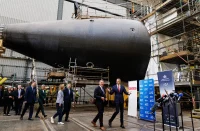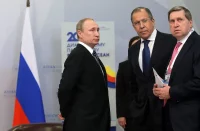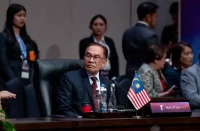Earlier this week Moscow and Ankara have signed an agreement to cancel the visa regime between the two countries and several other strategic deals including construction of the first atomic power station in Turkey.
Picture: Dmitry Medvedev and Abdullah Gul, Ankara, May 12, 2010.
It is the natural outcome of the process of mutual convergence of the two countries for the last two decades. Today Russia is the largest trading partner for Turkey while Turkey is number five for Russia. The Russian gaz satisfies 2/3 of the Turkish demand, for the last ten years hundreds of Turkishs construction companies has built 800 objects in Russia costing 17 billion USD.
Today we publish an article by the Director of the Russian Institute of Political Studies Sergey MARKOV on the new stage in Russo-Turkish relations. Although the text was written in Russian in 2009, it was not published in English until recently and is still actual. ORIENTAL REVIEW posts it with minor cuts
We know that we live in a new Russia—with freedom of speech and fair elections. Without a state ideology, but with the restored role of the ancient Eastern Christian Church. We are not a superpower, but we can travel to any country in the world. We have no confidence in the future, but we have the opportunity to become rich.
The new world gives us new opportunities. Two of the most important are China and Turkey . Everyone has noticed that both Russia and China have changed. In the near future, everyone will see that Turkey is also becoming something new. Turkey underwent enormous changes in the 1920s. For 300 years, the Ottoman Empire seemed to be the Russian Empire’s ‘eternal’ geopolitical rival in the Black Sea, the Caucasus and the Balkans. However, after being reborn in World War I , Turkey , under the leadership of Kemal Ataturk, and Bolshevist Russia found themselves allies against Western imperialism. The legendary Red Army commanders—Voroshilov, Budyonny and others—led Turkish troops into battle and became heroes in Turkey . Russia and Turkey were close allies, and they had virtually no other allies.
Where does history take us from here? After World War II Turkey became dependent on the West, and for 60 years it was an outpost of NATO and the United States in the region, a Cold War enemy of the USSR , although not its main enemy. But the USSR is gone, and the Cold War is over. NATO is no longer the obedient ally of the United States . Washington asked Ankara to allow troops to pass through Turkish territory for the invasion of Iraq — Turkey refused. The United States asked Turkey not to send troops into Iraqi Kurdistan— Turkey began fighting the Kurdistan Workers’ Party.
After the August 2008 war in South Ossetia, the United States decided to send an armada of ships to the Black Sea to intimidate Russia . Turkey essentially prohibited the United States from doing so by invoking the Montreux Convention of 1936. According to this document non-Black Sea countries are only entitled to send warships of limited tonnage into the Black Sea , and then for a short time. And immediately following the conflict Turkey ‘s Prime Minister flew to Moscow and actually expressed his understanding of Russia ‘s actions—thereby supporting it during the difficult days of fierce criticism from the West.
Turkey is no longer a US ally, although not everyone has recognized this reality—not even Turkey itself. For now, Turkey is just not making any abrupt movements toward the United States , because it wants to maintain the semblance of an alliance with the superpower in order to put pressure on it. Turkey stopped being a US ally because the role of the United States has changed in Turkish realities. Previously, Washington helped Ankara solve certain problems: suppress the Communist threat within Turkey and equip it with arms at minimum prices or even for nothing; help stabilize its political system, including by legitimizing military coups by the Turkish Army. Finally, Americans invested in the Turkish economy.
Now, the United States is not solving Turkey ‘s problems, it is creating problems. The de facto independent Kurdistan in Iraq is an American brainchild, and it is helping the Kurds in their armed struggle against the Turkish government. The United States is radicalizing Muslims and giving rise to terrorist groups that burn with hatred toward the Americans themselves and toward their allies. The United States is prepared to destabilize the region by starting wars in Iraq , the Caucasus and Iran . According to international polls, Turkey ‘s population has led the world in anti-American feelings for several years.
Disillusionment
This has shaken the principle of alliance with the United States , which has been a pillar of Turkish foreign policy for the last 60 years. This pillar can collapse at any moment. The second priority of the last 40 years has also become eroded—the country’s European perspective. Admission to the European Union was a wonderful goal. It would have allowed Turkey to strengthen its European-style economic and political institutions, lock in the secular nature of its society, receive EU subsidies and ensure rapid economic growth, as has happened in Spain . But today, this strategic goal has become unachievable after three decades of patient waiting.
The European Union is tired of expansion. Islamophobia is growing in European society in the wake of terrorist acts committed by people calling themselves Islamists. And recent changes in France ‘s constitution require the government to hold a referendum when an issue of EU expansion arises. Everyone remembers how Arabs burned cars in Paris and transformed its suburbs and some French cities into crime areas where police are afraid to go. And it is impossible to imagine that after this the weary inhabitants of France would agree to let more than 70 million Muslim Turks join the EU.
So Turkey has lost the bases of its foreign policy: its main goal and its main ally. The Turks themselves have not yet been able to accept it. Turkey’s leaders continue to talk about membership in the EU, but for several years now they have not even been able to begin accession negotiations (indeed, the talks may last for 30 years, and no one knows what the outcome will be).
As a result, the vector of Turkey’s foreign policy resembles the trajectory of a falling leaf in an autumn wind—as it was described by the famous Turkish public figure Fethullah Gülen, who has been recognized as one of the world’s foremost intellectuals by the Reuters Internet news agency and the American journal Foreign Policy.
The Turkish elite are increasingly coming to understand that a radical change is needed in the country’s foreign policy. Turkey cannot move towards Islamization, because that would rip it apart from the inside. All of its major cities are inhabited by a Europeanized secular middle class. In the 1990s, Turkey attempted to form a coalition of Turkic-speaking countries. But except for the partnership with Azerbaijan , this project proved to be inconclusive, costly and complicated. So what should they do? This question is becoming increasingly acute for Turkey . The country will be forced to become increasingly independent of the United States and the European Union and find new allies.
Moderate Islam—the key to success
Important changes are taking place within Turkey itself. As already mentioned, anti-Americanism is steadily increasing in its society. People are unhappy with the poorly understood Western model. Complaints directed against it are not limited to the global financial crisis and Islamophobia. Turks also believe that this model has given rise to a moral crisis. Therefore, they are searching for their own path, which would marry their national identity, traditions and, in particular, Islam with the best parts of the Western model. Namely: freedom of speech, democratic elections, rule of law and ethnic and religious tolerance.
Therefore, moderate Islamic trends are gaining ground in Turkey . This moderate, Europe-oriented Islamism is what ruling party leader Recep Tayyip Erdogan offered when he received tremendous support from voters. As a result, Turkey for the first time has no coalition government. Fethullah Gülen, a prominent Turkish thinker adherent of moderate Islamism, along with other Eurasian intellectuals has formed a powerful organizational structure—the Dialogue Eurasia Platform. Inspired by Gülen’s ideas, volunteers have opened more than eight hundred schools across the world—their students are inculcated with the idea that all religions, races and nations can coexist. Special importance is attached not just to quality education, but to teaching timeless values, as well. This moderate Islamism as personified by Erdogan, Gül and Gülen is important to us from two standpoints. First, Turkey could play an important role in international politics—integration of the Islamic world. Today, it is represented either in the form of radical Islamism (Al-Qaeda, Hizb-ut-Tahrir, Hezbollah, Hamas) or in the form of compradors, corrupt politicians and businessmen who are integrated into the Western elite and trade in their countries’ interests. These types of people often become leaders of Arab states.
Secondly, the experience of Erdogan, Gül and Gülen is useful for Russia , which is also searching for ways to combine Western institutions and national identity. It is vital that religion be given a greater role in both Russia and Turkey than in the swiftly secularizing and, indeed, post-Christian Western Europe .
The foreign and domestic political development of Turkey is intensifying political trends that orient it towards an alliance with Russia .
Moscow at the crossroads
Meanwhile, Moscow is experiencing difficulties in implementing its own foreign policy. Its policy, in essence, amounts to confronting the West—while at the same time seeking an alliance with it. Russia is forced to reject attempts to limit its sovereignty—primarily over control of its natural resources. It also has to resist encirclement by regimes that are hostile, non-democratic and controlled from Washington and Brussels .
However, the West and the post-Soviet space are very important to Russia . It offers the possibility of using Western know-how, including humanitarian know-how such as rule of law mechanisms and ways of fighting corruption and ensuring political pluralism. In addition, for Russia to remain sovereign it must become part of a broad, integrated union. And it is most natural for Russia to be the leader of a coalition of nations and countries in the post-Soviet space.
Russia ‘s foreign policy needs new resources. The formation of the soft military-political alliance with China within the Shanghai Cooperation Organization was crucial. An economic and somewhat political alliance with Turkey could become another important resource. This alliance would help to strengthen Moscow ‘s foreign policy potential. Turkey today may be the most underestimated country in international politics. But think about the stock market: you need to buy stocks while they are undervalued. And if we should offer such an alliance to Turkey —many people would immediately think twice and start looking at Turkey with different eyes.
How we can be friends
We will start with economics. Turkey can be invited to join the Economic Union with Russia, Belarus and Kazakhstan—presumably on the basis of Customs Union under construction. The economic structures of Russia and Turkey are not in competition with each other; rather, they are complementary. Russia has what Turkey does not: energy and other natural resources, sophisticated scientific schools, basic high-technology industries (nuclear and aerospace engineering, a military-industrial complex) and an advanced educational system. Turkey has what the Russian economy lacks: transit areas; a surplus labor force; and strong mid-sized businesses in such areas as construction, marketing, light industry and tourism.
And both Russian and Turkish businesses operate narrowly within their own economies. They need a large market. The EU market will be increasingly closed to them. The initiation of Turkey’s accession into the Customs Union will create bright opportunities for Turkey’s economy, strengthen the secular foundations of its national identity and, among other things, enhance its negotiating position with the EU and the United States. It will force everyone to recognize that Turkey is an important player in international politics. For now, I do not think the Turkish elites are ready for an alliance with Russia ; they are still in the grip of inertia. But when the previous policy failed, the country entered an acute crisis due to a struggle between two factions: Erdogan’s conventionally pro-Western Islamists and the secular, increasingly anti-Western military. But even the pro-Western Erdogan (incidentally, Turks call him the Turkish Putin) surprised everyone when he supported Russia in August 2008 rather than the United States and Georgia .
Typically, Erdogan’s opponents, the Turkish military, are also turning more openly away from the United States and looking towards Russia . And Russia needs to offer a specific alternative to Turkey, which is looking for new friends — Customs Union and a strategic political partnership. A geopolitical breakthrough. Turkey’s accession to the Customs Union can dramatically enhance the positions of other countries. For example, Turkey can be followed by Azerbaijan , which is establishing partner relations with both Turkey and Russia .
The Customs Union is natural economic coalition of countries in accordance with three criteria: they lie east of the European Union; they have no chance in the foreseeable future of becoming members of the European Union; and they are oriented towards maximum cooperation with the European Union. Accordingly, the Customs Union must not become a polar opposite of the EU, but rather the East European analogue of the European Union after 30-40 years. The basic principles of the Customs Union must be compatible with the EU’s principles; they must aim for maximum cooperation with the EU without membership; membership is a political impossibility. They must strive for relations with the EU under the Putin-Prodi formula: everything in common except organizational structures.
A political partnership could develop along with the economic alliance. It could be built, for example, around the South Caucasus peace platform that Turkey has proposed. It could include not only Georgia, Azerbaijan and Armenia, but Russia, Turkey and Iran, as well. And at the same time, it could exclude from Caucasian affairs external forces like the United States that destabilize the Caucasus .
To achieve all these goals we need to create a positive program for strategic cooperation. This program could be developed by a public coalition of businessmen working between Russia and Turkey , and politicians and experts who support improved relations between Russia and Turkey . This new alliance could become a reflection of the new Russian foreign policy and the new geopolitical situation in the world. And these instruments are already being developed.














Pingback: Tweets that mention New Russia and New Turkey in a New World | Oriental Review -- Topsy.com
Pingback: What Erdogan’s Big Victory In Turkish Elections Means | OrientalReview.org – DE LA GRANDE VADROUILLE A LA LONGUE MARGE